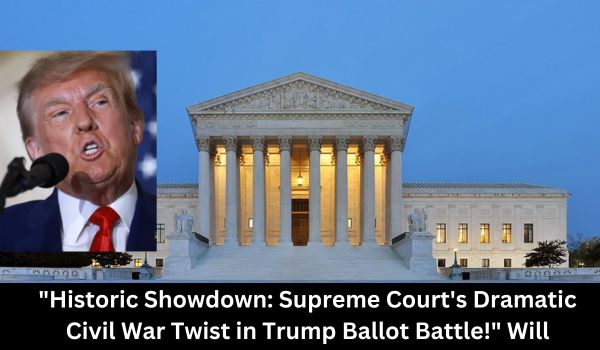“Historic Showdown: Supreme Court’s Dramatic Civil War Twist in Trump Ballot Battle!” Will Trump prevail?
Here’s a concise summary of the information:
- Chief Justice Salmon Chase’s historical decisions, made during the aftermath of the Civil War, are now relevant in the ongoing dispute over whether former President Donald Trump should be allowed on the ballot.
- Chase’s rulings touch upon Section 3 of the 14th Amendment, which disqualifies government officials who engaged in insurrection or rebellion from holding office again.
- The Supreme Court is currently considering Trump’s eligibility for the Republican primary ballot in Colorado based on this provision.
- The events leading up to the January 6, 2021, Capitol attack play a crucial role in this legal battle.
Intriguingly, history intertwines with contemporary politics as the Court grapples with this complex issue. 🗳️🇺🇸
WASHINGTON — It was in a packed courtroom in Richmond, Virginia — the former capital of the Confederacy — in December 1868 where Chief Justice Salmon Chase concluded that Jefferson Davis, the defeated rebel president, should not face prosecution for treason.
READ MORE: Trump’s Secret Move to Verify Legal Team – Shocking Revelations Uncovered!
Little would anyone have known at the time that Chase’s decision — in addition to another one he authored the following year touching upon the same legal issue but reaching a different conclusion — would re-emerge from the mists of history to play a role in the ongoing dispute over whether former President Donald Trump should be barred from office.
Both Chase cases — the other concerned a Black man seeking to throw out his criminal conviction — feature in court filings ahead of the Supreme Court’s oral argument in Trump’s case next week. In each instance, Chase was sitting on a lower court so was not acting in his role as chief justice of the Supreme Court.
Both include a rare contemporary discussion of Section 3 of the then-recently enacted 14th Amendment to the Constitution.
READ MORE: Donald Trump’s Terrible Economic Week
The provision was intended to prevent former government officials who joined the Confederacy from holding office after the Civil War. It states that those who previously took an oath to support the Constitution and then “engaged in insurrection or rebellion” are no longer qualified to serve again.
Chase’s rulings have taken on new relevance as the Supreme Court hears Trump’s plea that he not be removed from the Republican primary ballot in Colorado. He is seeking to throw out a Colorado Supreme Court ruling that said he is ineligible under Section 3 because of his role in seeking to overturn the 2020 presidential election results in a series of events that led to the Jan. 6, 2021, attack on the Capitol.
“I don’t know that any one case or any one justice from the past is going to be the dominant kind of theme or a talisman that the court looks at,” said Vikram Amar, a professor at the University of California Davis School of Law, who filed a brief that mentions Chase’s rulings.
But, he added, “If you’re trying to convince people about the understanding of the day, you want to make sure that you’re addressing what prominent people said and did back then.”
The history is relevant in part because several members of the conservative-majority Supreme Court put considerable weight on how people would have understood constitutional provisions at the time they were written.
Chase, who had his own ambitions to be president, was an anti-slavery Republican former governor of Ohio whom President Abraham Lincoln appointed to the Supreme Court in 1864. Even as chief justice he eyed the presidency, and historians say his rulings are inflected with political considerations.
At the time Davis’ case was before him, Chase was trying to win the Democratic nomination for president, although that effort had failed before he voted against proceeding with the prosecution.
Cynthia Nicoletti, a professor at the University of Virginia School of Law who wrote a book about Davis’ prosecution, said in an interview the argument adopted by Chase in the Davis case was a “weird one” that seems driven by political expediency.
“I do think it’s a clever maneuver for Chase to get rid of the case,” she said.
Chase appeared to embrace an argument made by Davis’ lawyers that Section 3, which clearly applied to the former Confederate president, was a form of punishment, thereby barring any criminal prosecution.
The lawyers argued Section 3 was “self-executing,” meaning that it automatically applied to Davis without the need for Congress to pass any legislation to enforce it.
Historians have concluded that Chase himself had suggested privately that Davis’ lawyers make that argument.
But just the following year, Chase took the opposite approach in another case in Virginia, this one involving a Black criminal defendant, Caesar Griffin, who argued that his conviction for “shooting with intent to kill” should be thrown out because the judge who presided over his case was a Confederate.
Section 3 applied to the judge because he had previously made an oath to support the Constitution as a member of the Virginia state legislature, Griffin argued.
This time around, Chase ruled that “legislation by Congress is necessary” for someone to be disqualified under the 14th Amendment, in part because of the far-reaching consequences of invalidating thousands of decisions made by officials with similar Confederate backgrounds to the judge in Griffin’s case.
The question of how exactly Section 3 can be enforced is one of several legal issues raised in Trump’s case, which could have far-reaching consequences if other states could then follow the lead of Colorado and remove him from the ballot.”
Information taken from www.nbcnews.com. Read more from this website by clicking here to know more.

